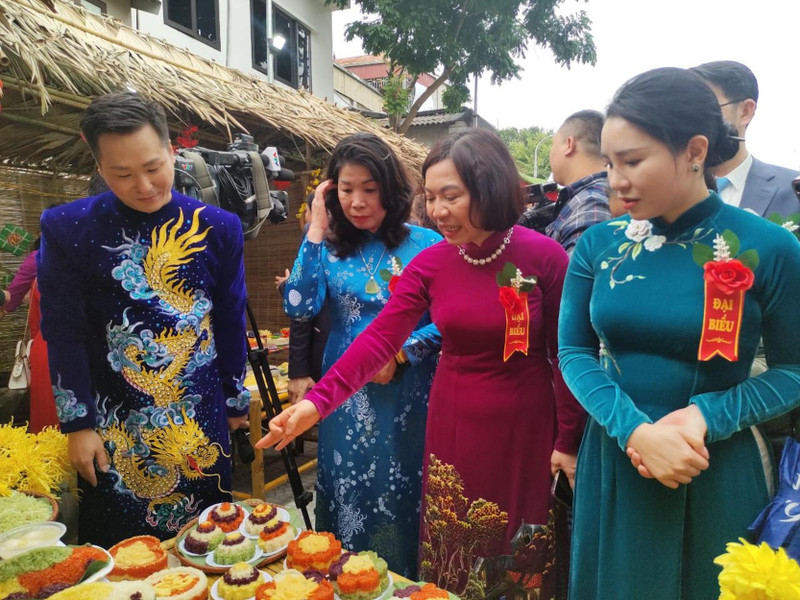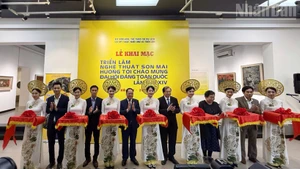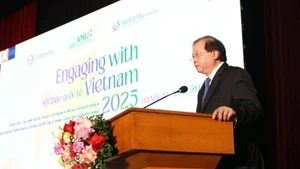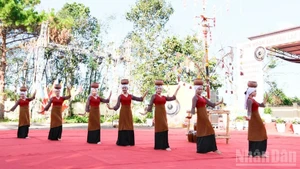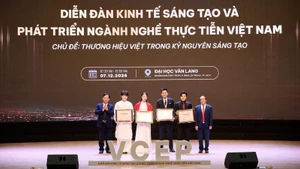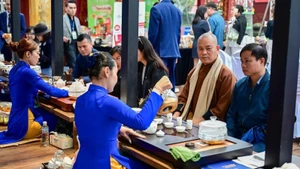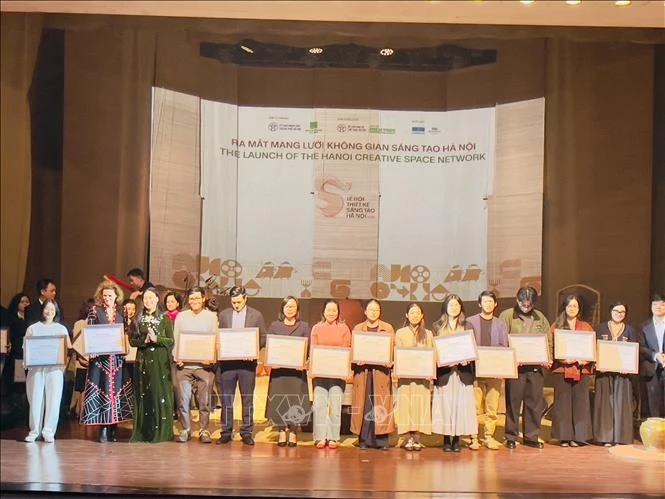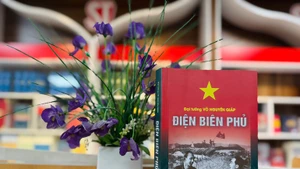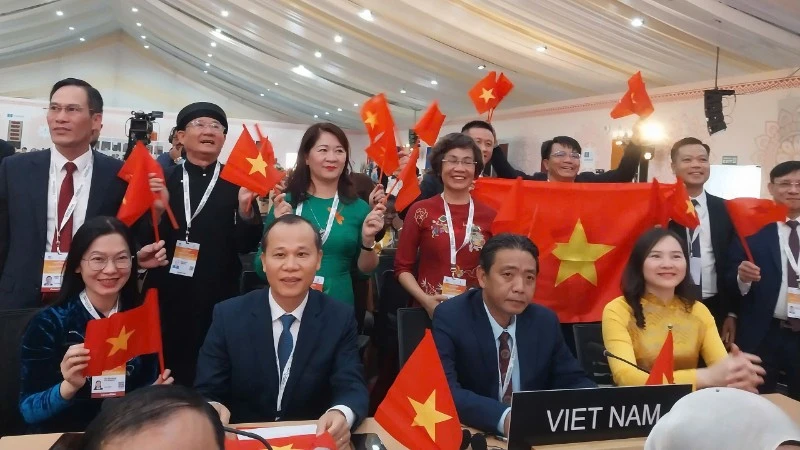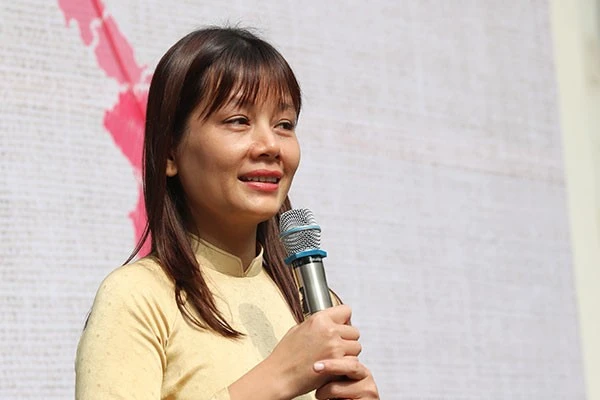With 600 households earning their livings by making sticky rice, this long-standing traditional cooking craft, recognised as a National Intangible Cultural Heritage, has become a feature of Phu Thuong Ward.
Even when the city is still asleep, hundreds of Phu Thuong households are already up, busy preparing for new batches of sticky rice. Houses are lit by red cooking fires, with smoke rising from huge sticky rice steamers.
Around 5 o’clock in the morning, cars and motorbikes roll to distribute freshly cooked sticky rice to every corner of the city, providing breakfast to the people of Hanoi.
In the past, the sticky rice cooking profession originated from Phu Gia Village. As time passed, it thrived in Phu Thuong Ward, becoming a traditional craft, with around 600 households engaging in the sticky rice trade. 95% of this profession’s workforce is female.
“The sticky rice cooking profession in Phu Thuong has hundreds of years of history. Many years ago, the women here used to cook sticky rice in clay pots and peddle them from street to street. Nowadays, Phu Thuong residents still follow that tradition. We are proud of the cooking techniques that not only make our sticky rice consistent in texture and fragrant in smell but also allow us to create a variety of sticky rice styles. This traditional craft helps the locals earn sufficient income and develop the local economy”, Vice President of Phu Thuong Sticky Rice Village Association Nguyen Thi Tuyen said.
Almost every household in Phu Thuong considers the sticky rice cooking profession as a family business, which often lasts at least three generations.
In the central parts of the city, shops often sell a few dozen kilograms of sticky rice a day. However, in Phu Thuong, only a small number of families cook from 10 to 20 kilograms of sticky rice daily. The rest makes about 30-40 kilograms of sticky rice, including various ingredients ranging from peanuts and beans to peas and corn.
Every day, the locals of “the village of sticky rice” - Phu Thuong - use approximately 10 tons of grain to cook their traditional dish. On the first lunar day of each month, full moon days, or during special occasions, Tet holiday, the amount of sticky rice sold often doubles or triples compared to other days. Wedding season is also the business season for Phu Thuong people since the number of orders tends to increase dramatically during weekends.
To ensure the special dish of Phu Thuong is chewy and fragrant, every step, from selecting grains and washing them to steaming rice, must be done meticulously, thoroughly, and intricately. It just needs a moment of carelessness for the sticky rice to be considered spoiled. That's why the rice used to make Phu Thuong sticky rice must be fresh. It should only be ground one day before being steamed.
The rice grains must be washed carefully to guarantee the dish’s flavour. Depending on each family’s experience and the type of rice grains, the soaking time may vary. After soaking, keep washing the grains until the water is clear. Phu Thuong’s sticky rice must be cooked two times. After the first time, the sticky rice is poured into baskets. Then, it is stirred until fully dry. After a certain amount of time, the sticky rice will be steamed again. That is why Phu Thuong sticky rice is always plump.
Another characteristic of Phu Thuong’s sticky rice is that it can retain a consistent texture and a tempting smell days after being cooked. That is the business secret of Phu Thuong residents. Mrs Mai Thi Thanh has been married to a man in Phu Thuong for decades. A few days after her marriage, her mother-in-law taught her how to cook sticky rice. Time flies as Mrs Mai has followed the sticky rice cooking craft for over 30 years.
Nowadays, to advertise the intricacy of the process of making Phu Thuong’s special dish, many youngsters here have been teaching how to cook sticky rice in person or via online platforms. Moreover, holding classes like that is also an effective method to promote Phu Thuong’s sticky rice. At first, many individuals attend the class because they want to follow the traditional profession. Nonetheless, afterwards, they gain a deeper insight into Phu Thuong’s sticky rice and, therefore, become loyal customers of this speciality.
“We are so glad to see the young in our ward opening online classes to teach people how to cook sticky rice because that is exactly how we hold the fire of our traditional craft village and promote our products. In this way, I believe that Phu Thuong’s sticky rice will be more and more popular, thus our profession will develop sustainably”, Mrs Nguyen Thi Tuyen said.
Not only does the sticky rice cooking craft of Phu Thuong provide residents with regular income but it is also recorded on the list of National Intangible Cultural Heritage. Head of the Heritage Management Office under the city Department of Culture and Sports, Pham Thi Lan Anh, stated that notwithstanding sticky rice is a popular Vietnamese dish, Phu Thuong’s version is increasingly unique due to its plump glutinous rice, consistent yet non-sticky texture, and fragrance. “These unique features are folk knowledge of the sticky rice cooking craft that we need to preserve and honour with a heritage approach”, she said.
